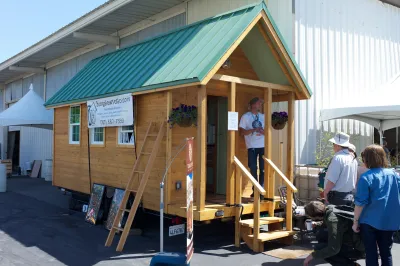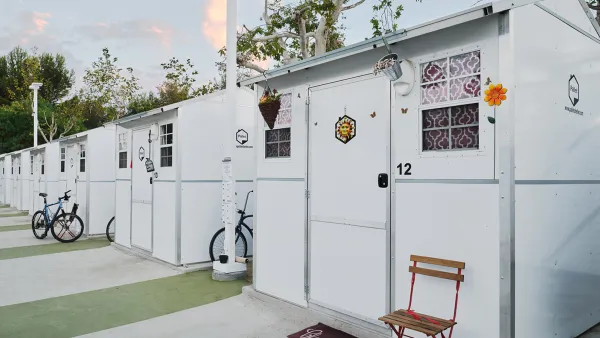Meant to serve chronically homeless people, the Licton Springs tiny house village has been controversial from the start. It's uncertain whether enough permanent housing exists to resettle all residents.

Seattle is one of several cities experimenting with tiny houses as a means to address chronic homelessness. This is the first time the city's phasing out one of its tiny house sites, which are meant to serve as transitional housing. Kate Walters writes, "The Licton Springs site opened on Aurora Avenue North in 2017 and was controversial from the get-go. Unlike most other villages and shelters in the city, alcohol and drug use are allowed at the Licton Springs site."
Nearby residents have associated the site with a noticeable increase in crime. But for those who've benefitted from the tiny houses, the future is now very uncertain. Service providers say that a lack of affordable housing makes it difficult to transfer residents into permanent dwellings. "Only 33 people were moved from tiny house villages across Seattle into permanent housing in the first six months of 2018. The number of tiny house villages has gone up this year, but the rate at which people are leaving for housing has gone down by 5 percent over the same time last year."
Meanwhile, Seattle appears to have learned something from the case. Namely, that a more hands-on approach is advisable. "City officials say lessons have been learned from the Licton Springs site, including that participation in case management and housing searches should be required."
FULL STORY: 'I'm scared.' Residents react to tiny house closures in north Seattle

National Parks Layoffs Will Cause Communities to Lose Billions
Thousands of essential park workers were laid off this week, just before the busy spring break season.

Retro-silient?: America’s First “Eco-burb,” The Woodlands Turns 50
A master-planned community north of Houston offers lessons on green infrastructure and resilient design, but falls short of its founder’s lofty affordability and walkability goals.

Delivering for America Plan Will Downgrade Mail Service in at Least 49.5 Percent of Zip Codes
Republican and Democrat lawmakers criticize the plan for its disproportionate negative impact on rural communities.

Test News Post 1
This is a summary

Test News Headline 46
Test for the image on the front page.

Balancing Bombs and Butterflies: How the National Guard Protects a Rare Species
The National Guard at Fort Indiantown Gap uses GIS technology and land management strategies to balance military training with conservation efforts, ensuring the survival of the rare eastern regal fritillary butterfly.
Urban Design for Planners 1: Software Tools
This six-course series explores essential urban design concepts using open source software and equips planners with the tools they need to participate fully in the urban design process.
Planning for Universal Design
Learn the tools for implementing Universal Design in planning regulations.
EMC Planning Group, Inc.
Planetizen
Planetizen
Mpact (formerly Rail~Volution)
Great Falls Development Authority, Inc.
HUDs Office of Policy Development and Research
NYU Wagner Graduate School of Public Service





























